|
|
|
Sort Order |
|
|
|
Items / Page
|
|
|
|
|
|
|
| Srl | Item |
| 1 |
ID:
001693
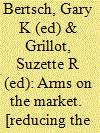

|
|
|
|
|
| Publication |
New York, Routledge, 1998.
|
| Description |
xiv, 239p.
|
| Standard Number |
0415920582
|
|
|
|
|
|
|
|
|
|
|
|
Copies: C:1/I:0,R:0,Q:0
Circulation
| Accession# | Call# | Current Location | Status | Policy | Location |
| 041185 | 367.1974/BER 041185 | Main | On Shelf | General | |
|
|
|
|
| 2 |
ID:
075783
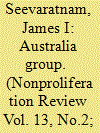

|
|
|
|
|
| Publication |
2006.
|
| Summary/Abstract |
The Australia Group's (AG's) contributions toward stemming global proliferation of chemical and biological weapons of mass destruction over the last 20 years are noted, in addition to the group's complementary role in effectively supporting the purpose and objectives of the Chemical Weapons Convention (CWC). This report also outlines the organizational and operational means that help accomplish the AG mission and notes the U.S. Congress' recognition of the role of the AG in countering chemical and biological weapons proliferation. Addressing criticism by some CWC states parties that question the AG's role in nonproliferation, the author also highlights the AG's expanded reach since September 2001 over terrorist activity. Finally,the article identifies a challenge the AG now faces in furthering its objectives and offers a possible solution.
|
|
|
|
|
|
|
|
|
|
|
|
|
|
|
|
| 3 |
ID:
142653
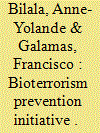

|
|
|
|
|
| Summary/Abstract |
The threat of terrorist use of weapons of mass destruction remains a daunting concern. Governments have undertaken several initiatives at the national and international level to prevent such illicit use, yet challenges remain. Notable is the absence of a single collaborative international forum of experts dedicated solely to bioterrorism prevention. The establishment of a Bioterrorism Prevention Initiative could be a possible solution to address this gap. This article explores possibilities for such an initiative and the ways in which it could strengthen the existing bio-nonproliferation regime.
|
|
|
|
|
|
|
|
|
|
|
|
|
|
|
|
| 4 |
ID:
006643
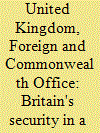

|
|
|
|
|
| Publication |
London, Foreign and Commonwealth Office, 1995.
|
| Description |
24p.
|
|
|
|
|
|
|
|
|
|
|
|
Copies: C:1/I:0,R:0,Q:0
Circulation
| Accession# | Call# | Current Location | Status | Policy | Location |
| 038420 | 355.033041/BRI 038420 | Main | On Shelf | General | |
|
|
|
|
| 5 |
ID:
000610


|
|
|
|
|
| Publication |
Washigton, D C, US House of Representative, 1999.
|
| Description |
174p.
|
|
|
|
|
|
|
|
|
|
|
|
Copies: C:1/I:0,R:0,Q:0
Circulation
| Accession# | Call# | Current Location | Status | Policy | Location |
| 041970 | 355.82/COM 041970 | Main | On Shelf | General | |
|
|
|
|
| 6 |
ID:
046628


|
|
|
|
|
| Publication |
London, Praeger, 1996.
|
| Description |
vii, 232p.
|
| Standard Number |
027595465X
|
|
|
|
|
|
|
|
|
|
|
|
Copies: C:1/I:0,R:0,Q:0
Circulation
| Accession# | Call# | Current Location | Status | Policy | Location |
| 045872 | 382.640973/HOF 045872 | Main | On Shelf | General | |
|
|
|
|
| 7 |
ID:
106357


|
|
|
|
|
| Publication |
2011.
|
| Summary/Abstract |
The adoption of UN Security Council Resolution (UNSCR) 1540 in 2004 reflects an emerging consensus that more should be done by the international community to address the proliferation of weapons of mass destruction. UNSCR 1540 articulates a universal, legally binding obligation for all states to confront proliferation by adopting effective export control systems. To date, however, there have been no attempts to systematically analyze compliance with this new obligation, making it impossible to assess the success of this measure and the underlying causes of any shortcomings. This study addresses this by conducting a systematic empirical analysis of state compliance with UNSCR 1540. Drawing upon theories of compliance with international law, we investigate two distinct explanations for variation in the degree to which states adopt nonproliferation export controls: one based on state interests and enforcement and the other based on state capacity. Our statistical tests of these theories use a new, cross-national data set detailing the nonproliferation policies of 30 states. The empirical results indicate that compliance with international nonproliferation obligations is influenced most by a state's economic and governmental capacities and has little to do with interest-based factors. These findings suggest that capacity-building programs are the best option for improving the implementation of UNSCR 1540 and of nonproliferation efforts in general.
|
|
|
|
|
|
|
|
|
|
|
|
|
|
|
|
| 8 |
ID:
012309
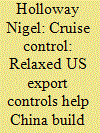

|
|
|
|
|
| Publication |
Aug 14 1997.
|
| Description |
14-16
|
|
|
|
|
|
|
|
|
|
|
|
|
|
|
|
| 9 |
ID:
135249
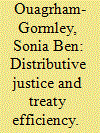

|
|
|
|
|
| Summary/Abstract |
This article evaluates the security value of controls over biotechnology transfers and of new restrictions on the spread of scientific results: to what extent do they improve the implementation of the Biological Weapons Convention (bwc)? Although the questions of justice that have plagued the bwc regime since its creation in 1972 have been analyzed extensively, the effects of current controls over dual-use research and the propagation of scientific results on the implementation of the bwc have not been fully addressed. It is argued that although controls over biotechnology transfers increase security because they delay covert programs by creating integration challenges, controls on the spread of scientific results have no security value. They instead may lead to a decreased implementation of the bwc.
|
|
|
|
|
|
|
|
|
|
|
|
|
|
|
|
| 10 |
ID:
184665


|
|
|
|
|
| Summary/Abstract |
Like other normative systems, the international nuclear export control norms are incomplete and at times contradictory. Thus, contestations to the international nuclear export control norms inevitably emerge, as they did in the wake of the 1974 Indian nuclear test and the 1991 discovery of Iraq’s nuclear weapons program. These two nuclear crises prompted intense debates regarding the adequacy of the existing norms. The outcome of the debates generated overwhelming agreement and action among nuclear suppliers that they required strengthening. Drawing on Wayne Sandholtz’s theory of normative change, which argues that events trigger disputes whose outcomes modify norms, this article illustrates how the nuclear export control norms have evolved in a cyclical fashion. The article aims to contribute to the constructivist literature on normative change and discusses policy implications.
|
|
|
|
|
|
|
|
|
|
|
|
|
|
|
|
| 11 |
ID:
144286


|
|
|
|
|
| Summary/Abstract |
While nuclear suppliers compete in markets, they simultaneously partner in other fields. This produces a delicate relationship between civilian nuclear programs and nuclear weapon proliferation. This study explores how export competition affects suppliers’ conditions of supply related to nuclear nonproliferation. We investigated three export cases (India, North Korea, and South Korea) and identified four effects that competition has on the conditions of supply related to nonproliferation. First, under highly competitive conditions, suppliers might hesitate to enforce the conditions of supply to avoid negotiation conflicts with recipients. Second, suppliers focus on politically and economically attractive recipients while mostly ignoring unattractive ones, perhaps allowing proliferation problems to fester out of view in marginal states. Third, suppliers can build consensus on the conditions of supply to avoid being the only party experiencing negotiation conflicts. Fourth, suppliers can constrain others from relaxing the conditions of supply to maintain economic benefits and nonproliferation norms. The first two effects accelerate proliferation while the last two promote nonproliferation. Although the extent of these effects can vary with changes in nonproliferation norms, they can contribute to our understanding of the relationship between nonproliferation and civilian nuclear programs.
|
|
|
|
|
|
|
|
|
|
|
|
|
|
|
|
| 12 |
ID:
160997


|
|
|
|
|
| Summary/Abstract |
In connection with United Nations Security Council Resolution (UNSCR) 1540, the Federal Government of Germany, in cooperation with the United Nations Office for Disarmament and the European Commission’s Outreach in Export Controls Programme, created the “Wiesbaden Process,” a series of conferences designed to promote awareness of the goals of UNSCR 1540. National authorities organizing the regional variants of the Weisenbaden Process invite representatives of large enterprises likely to be concerned by nonproliferation topics. The benefits of these conferences never reach other stakeholders, in particular small and medium-sized enterprises (SMEs), creating an apparent gap in the implementation of UNSCR 1540. This article discusses the proposed creation of an “industry network” to further the political objectives of UNSCR 1540 and proposes general organizational rules for future Wiesbaden conferences.
|
|
|
|
|
|
|
|
|
|
|
|
|
|
|
|
| 13 |
ID:
000635


|
|
|
|
|
| Publication |
New York, Routledge, 1999.
|
| Description |
xx,284p.
|
| Standard Number |
0-415-922082-8
|
|
|
|
|
|
|
|
|
|
|
|
Copies: C:1/I:0,R:0,Q:0
Circulation
| Accession# | Call# | Current Location | Status | Policy | Location |
| 042074 | 327.73054/BER 042074 | Main | On Shelf | General | |
|
|
|
|
| 14 |
ID:
074372


|
|
|
|
|
| Publication |
2006.
|
| Summary/Abstract |
This article explores the impact of the EU Code of Conduct on Arms Exports on national legal frameworks, using the case studies of Belgium, Germany and Italy. It considers the differential impact of Europeanisation on high- and low-regulating countries and how non-legally binding decisions agreed in the framework of the CFSP nevertheless exert pressure on member states. It argues that the Europeanisation impact of the Code has not been insignificant, but that it has not had a uniformly strengthening impact. Rather, the Europeanisation of the Code of Conduct has promoted convergence, weakening strong national frameworks and strengthening weak ones.
|
|
|
|
|
|
|
|
|
|
|
|
|
|
|
|
| 15 |
ID:
144538


|
|
|
|
|
| Summary/Abstract |
This paper seeks to provide an original examination of the nature of the proliferation of sensitive materials and technologies by Chinese entities. A number of publications have attempted to understand the issue of proliferation stemming from businesses based in China, with many having commented on the efforts undertaken both by international actors and by the Chinese government to prevent it. However, relatively few scholars have sought, in any systematic and sustained way, to understand the types of Chinese companies involved in proliferation and the evolution of their behaviour. This paper seeks to argue and account for the declining role of, and concern regarding, Chinese state-owned enterprise in the global proliferation problem. Different accounts for this change, and the relating proliferation challenge posed by China, are examined.
|
|
|
|
|
|
|
|
|
|
|
|
|
|
|
|
| 16 |
ID:
160989


|
|
|
|
|
| Summary/Abstract |
The separation between export control and counterproliferation finance (CPF) efforts may be undermining governments’ ability to detect and stop weapons of mass destruction (WMD) proliferation. Using export-control information in screening financial transactions and using financial information in export-control decision making can be mutually reinforcing, each system feeding new information back to the other, creating a fuller picture of proliferation procurement networks. This article begins by identifying the US domestic agencies and international bodies involved in export controls and CPF, respectively, followed by a brief outline of the international and domestic sanctions regimes and export-control implementation. It then examines why financial information has historically not been considered relevant to export control and why export-control information is not regularly used to stop financial crime. The article then discusses the limitations of existing proliferation-finance guidance provided to financial institutions, as well as the problematic exclusion of marine insurance from US anti-money-laundering regulations and how it detracts from counterproliferation efforts. The authors conclude with a series of concrete options for better integrating export-control enforcement and combating proliferation finance, including options for both the US and the international community.
|
|
|
|
|
|
|
|
|
|
|
|
|
|
|
|
| 17 |
ID:
006538


|
|
|
|
|
| Publication |
Washington, D.C., Office of Technology Assessment, 1993.
|
| Description |
181p.
|
|
|
|
|
|
|
|
|
|
|
|
Copies: C:1/I:0,R:0,Q:0
Circulation
| Accession# | Call# | Current Location | Status | Policy | Location |
| 038127 | 382.64/EXP 038127 | Main | On Shelf | General | |
|
|
|
|
| 18 |
ID:
016056
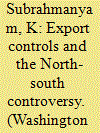

|
|
|
|
|
| Publication |
Spring 1993.
|
| Description |
135-144
|
|
|
|
|
|
|
|
|
|
|
|
|
|
|
|
| 19 |
ID:
168438


|
|
|
|
|
| Summary/Abstract |
In 2004, the United Nations Security Council adopted resolution 1540, which acknowledged the non-state acquisition of weapons of mass destruction as a security threat and called on member states to implement “appropriate effective” domestic trade controls. The United States, however, has both promoted the multilateral implementation of strategic trade controls but has also increasingly resorted to extraterritorial enforcement of its counterproliferation rules. How can a multilateral, norms-based international regime like 1540 contend with extraterritorial enforcement based on national interests? We argue that increased U.S. extraterritorial counterproliferation policies are a consequence of the inconsistent implementation of resolution 1540, adaptive and resilient proliferation networks, and a history of expanding legal interpretations of jurisdiction. We find that while U.S. extraterritorial enforcement can effectively disrupt networks hiding in overseas jurisdictions, doing so creates disincentives for states to implement 1540 obligations and undermines broader nonproliferation objectives.
|
|
|
|
|
|
|
|
|
|
|
|
|
|
|
|
| 20 |
ID:
187497


|
|
|
|
|
| Summary/Abstract |
Nonproliferation systems comprise agreements designed to work in concert to manage specific security risks. New technologies, however, are exacerbating these risks by perforating controls and evading regulations while revealing limitations in the utility of these tools for managing threats from emerging dual-use technologies. This article first looks at how regime augmentation and control-list modernization have worked as solutions to past challenges for nonproliferation systems. Second, it argues that new drivers of this risk are creating near-unmanageable conditions. These drivers include the increased rate of production of novel technologies; the digital format of newer technologies, as well as the digitization of existing weapons technologies, platforms, and systems; and the diffusion and latency these drivers facilitate. Finally, the article assesses the feasibility of control-list modernization as a solution to risks posed by rapidly emerging and evolving dual-use technologies today. It argues that nonproliferation efforts should endeavor to preserve the control systems currently in place while simultaneously pursuing complementary measures to mitigate the effects of the digital diffusion of dual-use technologies.
|
|
|
|
|
|
|
|
|
|
|
|
|
|
|
|
|
|
|
|
|